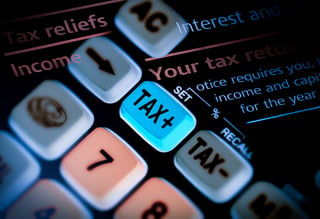
This post originally appeared on blog.COPDstore.com you can view the original article here.
Tax time is upon us again. It seems that tax burden is going up every year and refunds area getting smaller and smaller. But, according to the IRS, a large percentage of allowable deductions go unclaimed every year.
If you feel like a little light reading before bed time you can review the 2015 US tax code to make sure you’re getting everything you are entitled to.
It’s only 74,608 pages! IRS Section 502 which pertains to medical deductions is only 27 pages but we’ve hit some of the highlights here for you so you can ask your tax professional about them.
These numbers change over time but generally speaking you should be able to write off 20% of medical expenses over $2120 if your taxable income is $84,000 or less.
You probably already know that if you purchased a concentrator in 2015 you can write off the purchase price. Section 502 states, “You can include any medical expenses you pay for oxygen and oxygen equipment to relieve breathing problems caused by a medical condition.” Don’t forget to keep track of oxygen supplies such as cannulas and filters as well. Those things can really add up over time. Diagnostic equipment is also covered in Section 502. If you’ve purchased a pulse oximeter or spirometer to better monitor your COPD or other respiratory condition save your receipt.
You may also be able to deduct energy costs associated with your concentrator.
To find out the amount of this deduction you have to figure out how many kilowatt hours your concentrator uses per year.
If the manual doesn’t give you a specific number you can figure it out by multiplying volts times amps.
For instance 125 volts X 5 amps= 625 watts. Call your electric company or refer to your bill to find out how much your provider charges per kilowatt hour.
Take 625 x .001=.63 KW. Multiply that number by 24 hours x 365 days per year. .63 x 24 x 365=5518.8. That number is your kilowatt hours per year.
Multiply that number by the price your energy company gave you. So if that price is ten cents your formula would be 5518.1 x .10=551.88. $551.88 is the cost of operating your concentrator per year. To visit the COPD Foundation’s explanation of how to calculate costs, click here.
If you’ve quit smoking this year, first of all congratulations!! Secondly any expenses incurred to assist you may be tax deductible.
This includes patches or medications, but can also be applied to less orthodox methods such as hypnotism, natural supplements, acupuncture treatments, or the purchase of any books, music meditations, or video products.
Weight loss programs can be deducted as well if it is considered as a treatment for a chronic illness.
Fees for meetings, gym memberships, or exercise classes should all be considered here if they are specifically recommended by your doctor to improve your condition not just for overall health improvement.
Writing off food specifically for a diet regimen can possibly be deducted but it gets tricky here so it’s best to consult your tax professional on this one.
Many with COPD have mobility challenges as well.
If you have modified your home with ramps, installed a special shower, hand rails in the bathroom, widened doorways to accommodate wheel chairs, or otherwise modified your home to accommodate your condition, you may be able to deduct this expense.
Purchasing mobility aids and the cost of maintaining these devices is also deductible. If you’ve had to make any modification to your car, these are deductible as well.
The best way to make sure you get every deduction to which you are entitled is to keep receipts for everything health related. Divide them up into Dr. expenses, medicine costs, equipment purchases, and other.
This will make it easier to go over with a tax preparer so they can advise you about what you can deduct. Oh and by the way, the money that you pay that preparer you can deduct on next year’s taxes!
Please share this information with all family and friends that this may benefit from these tips to help them get the most out of their refund as well!
Related Blog Posts:
- 3 Ways to Get a Return Investment on Your Portable Oxygen Concentrator
- Portable Oxygen Needs On the Rise but HME Industry is Declining
- Free E-Book: Submitting a Claim to Insurance or Medicare for Reimbursement





